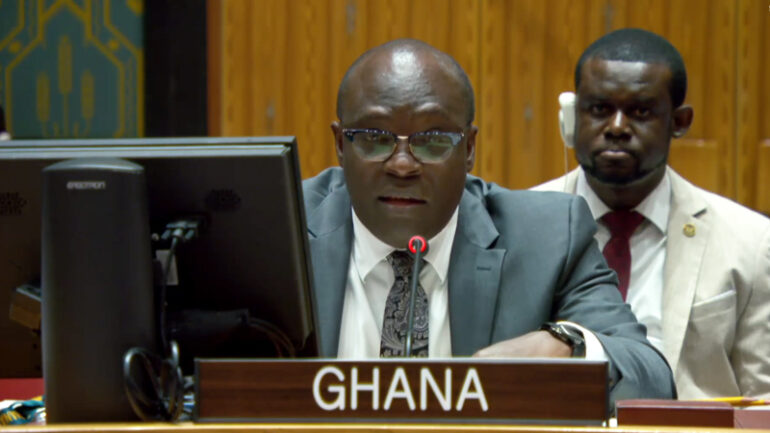UN Security Council open debate Advancing public-private humanitarian partnership

Ambassador Harold Agyeman
Ghana’s Representative to the United Nations
Security Council Chamber
United Nations, New York
September 14 2023
Mr. President,
We begin by thanking Albania for convening this important and novel open debate, and note, with appreciation, the insightful briefings by Ms. Cindy H. McCain, Executive Director of the World Food Programme (VTC), Mr. Jared Cohen, President of Global Affairs and Co-head of the Office of Applied Innovation at Goldman Sachs and Mr. Michael Miebach, CEO of MasterCard. The unprecedented level of humanitarian needs globally, which is being driven strongly by factors such as conflicts, insecurity, climate change and the prevailing socio-economic global headwinds, should perforce require all of us to reconsider how we can mobilize support at all levels for effective responses.
As the August update of the Global Humanitarian Overview indicates, 248 million of the 363 million people in need of assistance around the world require some US$55.2 billion if we are to be able
to respond to their needs. With a staggering financial requirement gap of US$39 billion at this time of the year, new opportunities beyond the known limits should be explored to better understand how the interests of the private sector can be made to coincide with the universal and solidaritybased framework of multilateralism in delivering humanitarian assistance to those most in need.
In this regard, we welcome this opportunity for intergovernmental discussions on sustaining the private sector’s involvement in humanitarian action and would want to highlight four (4) main points.
First, we hold that public-private partnerships for humanitarian action should be based on shared principles and values that respect the core consensus of the international community for humanitarian action, which is based on humanity, neutrality, impartiality and independence. Without common principles, we face the risks of undermining the convergence that we seek between the influence of the markets and those of humanitarian actors. In this context, we believe that the work that has been done by OCHA and the World Economic Forum in developing Guiding Principles for PublicPrivate Collaboration for Humanitarian Action and the Agenda for Humanity as well as the principles jointly developed by a number of UN funds and programmes and private sector companies for humanitarian payments, can serve as a basis for deepening collaboration in response to the growing humanitarian needs.
Secondly, it is important to underscore that partnership for humanitarian action should be undergirded by the application of emerging technologies as a strategic goal, to anticipate needs and
facilitate the reach and scale of humanitarian responses, but also efficiency and effectiveness of humanitarian performance. Equally important is the need for UN humanitarian actors to embrace new technologies in their humanitarian architecture to pick up early warning signals, coordinate and deploy resources when it can be most effective, and identify the needs of the victims in ways that can help create sustainable and self-reliant humanitarian outcomes.
Thirdly, we encourage the strong development of public-private partnerships at the regional level to help diversify capabilities, create regional resilience and nurture home-grown experiences and
solutions. We therefore urge cooperation between the private sector companies on the continent of Africa and regional humanitarian frameworks such as the African Union’s Humanitarian Policy and the ECOWAS Humanitarian Policy to advance sustainable regional humanitarian outcomes. We are mindful that in advancing Africa’s stability and resilience, we also reduce the risks of the continent’s private sector companies and facilitate the interests of our governments in fulfilling national aspirations. We therefore encourage the continuing development of a conducive environment that sharpens the convergence of interests and mobilises joined-up action in effectively dealing with regional humanitarian crises.
Fourthly, at the heart of addressing the global humanitarian crisis is the need to prioritize investments that address the root causes for the growing humanitarian needs. We urge in this regard critical attention for the structural and institutional drivers that are affecting governance and development, and call for all segments of society, particularly women and the youth to be at the forefront of national processes. They cannot be left behind. We also urge the continuing role of the Peacebuilding Commission in helping countries resolve fragilities, including from triggers of conflict, the impact of climate change, and as part of the post COVID-19 recovery process.
Mr. President,
In concluding, Ghana believes that even as we enhance publicprivate partnerships for humanitarian action, solidarity must be sustained and strengthened among Member States for times of great
humanitarian crisis. We therefore believe that the call to donors, including for this year, would continue to be an important one, to fill up financing gaps in the humanitarian response plans. We support the SecretaryGeneral’s call in this regard.
Finally, as we look forward to a well-structured partnership in dealing with humanitarian crises across the world, Ghana remains hopeful that partnerships at the national, regional and international levels, would help unlock innovative, effective and efficient ways for delivering on resilient and sustainable societies for the benefit of the peoples of our shared world.
I thank you, Mr. President.
